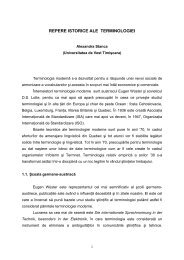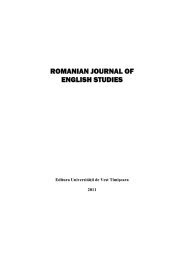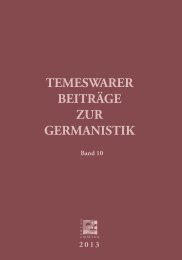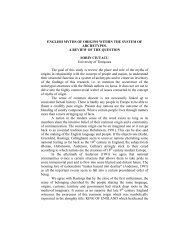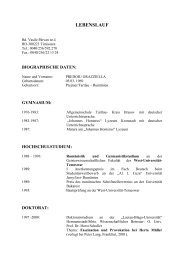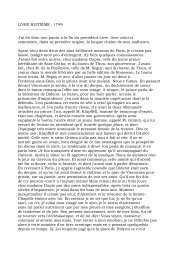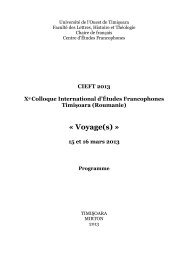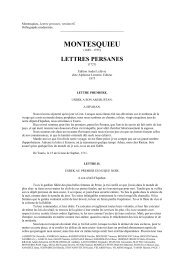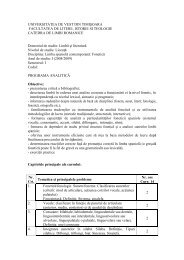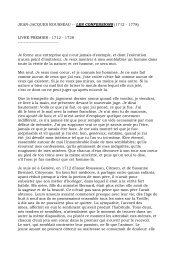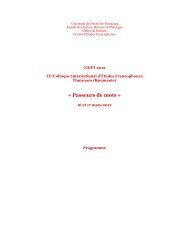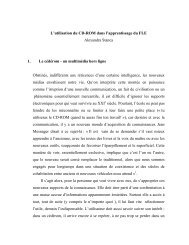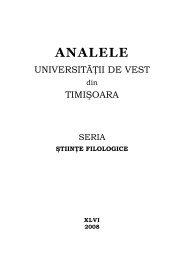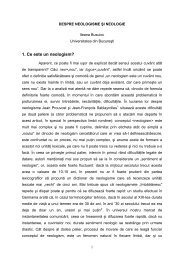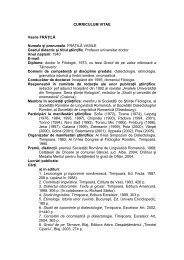TRANSLATION AND MEANING: A CULTURAL- COGNITIVE ...
TRANSLATION AND MEANING: A CULTURAL- COGNITIVE ...
TRANSLATION AND MEANING: A CULTURAL- COGNITIVE ...
You also want an ePaper? Increase the reach of your titles
YUMPU automatically turns print PDFs into web optimized ePapers that Google loves.
6.2. Differences between genres<br />
According to the considerations above, if TRL is the most frequent<br />
operation in film dramas, horrors and adventures, it must be because in<br />
these genres the translation process happens in a primary communication<br />
situation with no significant difference in available background<br />
assumptions, that is, cognitive environments. This also includes that the<br />
assumptions relating to the typical ways (norms?) of giving titles to films in<br />
these genres are not significantly different in the cognitive environments of<br />
the source and target audiences. And thus A vonzás szabályai is just as<br />
relevant a title for a film drama as the English original The Rules of<br />
Attraction, Szellemhajó is just as relevant a title for a horror film as Ghost<br />
Ship and Kapj el, ha tudsz! is just as relevant a title for an adventure movie<br />
as Catch Me If You Can.<br />
In film comedies there can be observed an essential difference<br />
between usual ways of giving titles in English and Hungarian. While<br />
English titles typically communicate explicitly, through their explicatures,<br />
as well as implicitly, Hungarian titles in this genre build much more<br />
characteristically on implicatures of a humorous kind. Typically, they<br />
employ puns or distorted expressions. Thus if we assume that these norms<br />
are represented in the cognitive environment of the audience by assumptions<br />
relating to the way a title is meant to achieve its relevance, then in this case<br />
we are dealing with culture-specific assumptions and, consequently, a<br />
secondary communication situation, in which, as we have seen above, the<br />
application of MOD is an obvious option. The following examples will<br />
serve to illustrate this point: Hungarian Birkanyírás (“sheep shearing”) for<br />
the English original Barbershop, Hajó a vége (untranslatable pun: “if it ends<br />
well + it ends with a boat”) for Boat Trip, Ki nevel a végén (untranslatable<br />
pun: “who will educate in the end + who will laugh in the end”) for Anger<br />
Management, Szakítópróba (“tearing test”) for Just Married, and Több a<br />
sokknál (untranslatable pun: “more than enough + more than a shock”) for<br />
Bringing Down the House.<br />
6.3. Other observations<br />
The relative frequency of TRF in film dramas is easy to explain: it is<br />
because many of the film titles in this genre consist of a personal name and<br />
personal names in the default case are simply transferred (see Vermes<br />
2003), as are the names in the following titles: Frida, Gerry, Max, or<br />
Miranda.



